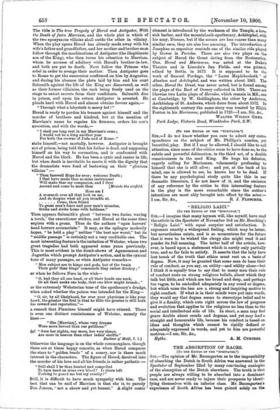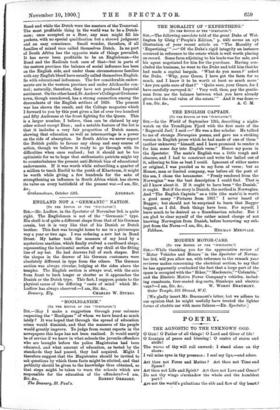THE ABSORPTION OF RACES.
[TO THE EDITOR OF THE "SPECTATOR."]
Sra,—The opinion of Mr. Baumgarten as to the impossibility of absorbing the Dutch in South Africa was answered in the Spectator of September 22nd by many convincing analogies of the absorption of the Dutch elsewhere. The truth is that people are always willing to be absorbed into a dominant race, and are never ready to injure their prospects by identi- fying themselves with an inferior class. Mr. Baumgarten's experience of South Africa has been gained solely on the Rand and while the Dutch were the masters of the Transvaal. The most profitable thing in the world was to be a Dutch- man; once accepted as a Boer, any man might fill his pockets, with no special qualification but a shrewd judgment and an easy conscience. Small wonder, therefore, if all families of mixed race called themselves Dutch. In no part of South Africa has the opposite state of things prevailed. It has never been profitable to be an Englishman—the Bond and the Radicals took care of that—but in parts of the eastern province the balance of social influence has been on the English side, and under these circumstances families with any English blood have usually called themselves English. So with educational influences. The few considerable endow- ments are in the western province and under Afrikander con- trol; naturally, therefore, they have not produced Imperial sentiment. On the other hand, St. Andrew's College at Grahams- town, though unendowed, has a strong connection among the descendants of the English settlers of 1820. The present war has shown the result, and the College magazine which I forward to you by this post gives a list of over two hundred and fifty Andreans at the front fighting for the Queen. This is a larger number, I believe, than can be claimed by any other school except Eton ; and a notable feature of the list is that it includes a very fair proportion of Dutch names, showing that education as well as intermarriage is a power on the side of absorption. In South Africa we never expect the British public to favour any cheap and easy course of action, though we believe it ready to go through with its difficulties when once realised ; but it should not be too optimistic for us to hope that enthusiastic patriots might try to counterbalance the present anti-British bias of educational endowments. If it was worth while subscribing a quarter of a million to teach Euclid to the youth of Khartoum, it might be worth while giving a few hundreds for the sake of strengthening an influence in South Africa which has shown its value on every battlefield of the present war.—I am, Sir, &c.,







































 Previous page
Previous page